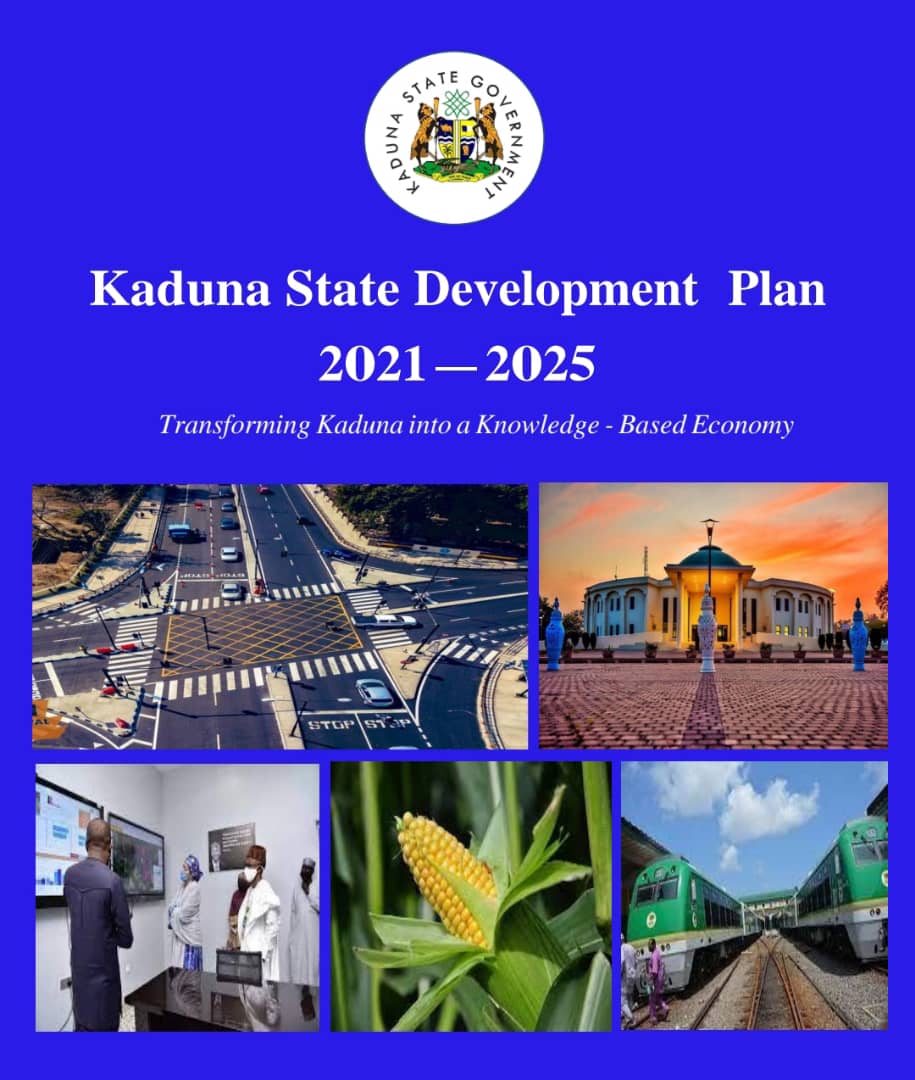By Yusuf Ishaku Goje
The Kaduna State government in its State Development Plan (SDP, 2021-2025) committed to improved quality of life of Kaduna citizenry. Hence, it remains the basis for measuring the performance of the government beyond the reforms and capital projects executed.
While the means is expected to justify the end, in this case, the end is what will justify the performance of the State government. This raises the question – that the government has built or rehabilitated hospitals, schools and roads, how have that reduced child and maternal mortality, improved literacy rate and inclusively boosted the economy respectively?
To answer the above question in context, reference is to be made to the SDP – where the State government provided outcomes, indicators, baselines and targets to measure and score its performance. For instance, under the overall impact (goal), an indicator is GDP per Capita (naira) with a 2019 baseline of 314,251 and targets of 329,964 in 2021, 346,462 in 2022, 363,785 in 2023, 381,975 in 2024 and 401,073 in 2025.
Secondly, poverty rate (Income) has a 2019 baseline of 84.9% and targets of 82 in 2021, 80 in 2022, 78 in 2023, 76 in 2024 and 74 in 2025. Thirdly, Life Expectancy (years) has 2019 baseline of 54.81 and targets of 56 in 2021, 57 in 2022, 58 in 2023, 59 in 2024 and 60 in 2025. Finally, Human Development Index has 2019 baseline of 0.532 and targets of 0.55 in 2021, 0.55 in 2022, 0.56 in 2023, 0.56 in 2024 and 0.57 in 2025.
Coming down to the sectors, the expected outcome of health is – improved comprehensive quality sexual, reproductive, maternal, neonatal, child and adolescent health and nutrition services. One of the indicator for measuring the above outcome is proportion of delivery taken by Skilled Birth Attendant (SBA) with the targets of 10 in 2021, 20 in 2022, 40 in 2023, 50 in 2024 and 60 in 2025. Another indicator is – infant mortality rate per live birth with targets of 80/1000 in 2021, 60/1000 in 2022, 30/1000 in 2023, 25/1000 and 20/1000.
Under the Education sector, there is an outcome on – improved learning outcomes. The indicator for measurement is the percentage of candidates who passed with at least 5 credits including English and Mathematics in WAEC, NECO and BECE – with a 2019 baseline of 27.88 for WAEC and targets of 30 in 2021, 35 in 2022, 40 in 2023, 45 in 2024 and 50 in 2025.
Another outcome in the sector is: improved quality of teaching at all levels with one of the indicators being Primary Qualified Teacher: Pupil Ratio with a 2019 baseline of 1:78 and targets of 1:65 in 2021, 1:60 in 2022, 1:55 in 2023, 1:50 in 2024 and 1:45 in 2025. As for Adult Literacy rate the 2019 baseline is 62% and targets of 63% in 2021, 63% in 2022, 64% in 2023, 64% in 2024 and 65% in 2025.
The agriculture sector similarly has an outcome of – increased yield of major crops in metric tones per hectare (maize, soya beans, sorghum, ginger, rice, ground nuts fonio (acha) and millet). Under this, one of the indicator is Maize yield, with a 2019 baseline of 2.5 Mt/ha and targets of 5.5% in 2021, 5.7% in 2022, 6.0% in 2023, 6.2% in 2024 and 6.5% in 2025.
There is no doubt the Kaduna State government has implemented reform programs such as the Kaduna Economic Transformation Program for Results – Open Government Partnership (OGP) – State Fiscal Transparency, Accountability & Sustainability (SFTAS) program for result – Public Service Revitalization and Renewal Project as well as capital projects under the Urban Renewal Projects among others.
However, the questions remain, how are all of these celebrated reforms and capital projects’ outputs translating into the outcome results captured in the SDP? This is in the light that no evidence to show that Sectors ( in line with the Sector Implementation Plans) in State hold annual performance review with stakeholders or the government publicly makes available the reports in line with the State’s Result-based Monitoring and Evaluation policy.
This is to say that there is no publicly available evidence to show improvement or actualization overall as well as in all sectors in terms of the 2021 and 2022 targets compared to the 2019 baseline?
It is time to go beyond celebrating outputs to focusing on outcomes, which is what will be used measure the government’s SDP aspiration of improved quality of life of Kaduna citizenry.
Lets engage, ask the right questions and hold the government accountable.
Yusuf Ishaku Goje is Concerned Citizen and a member of the civil society in Kaduna State.






